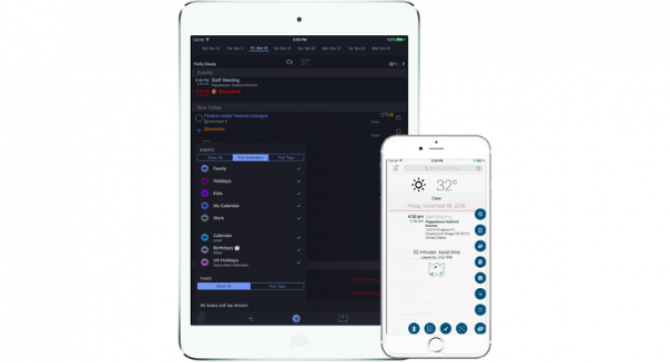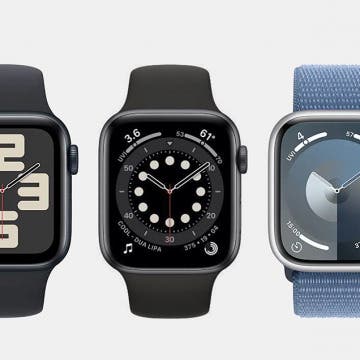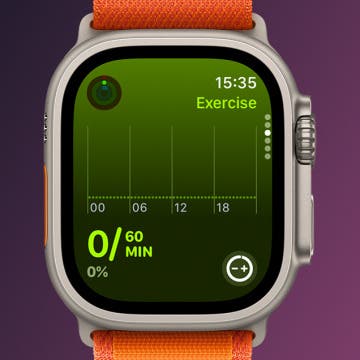What to Know
- The Apple Watch 10 will be released this fall - rumors predict a bigger screen, thinner body, and a new magnetic band attachment system.
- The new watchOS 11 public beta software is available, allowing users to test new features.
- Doctors are prescribing Apple Watches to patients. Will insurance help?

This is an exciting time for Apple Watch enthusiasts! Apple Watch’s 10 year anniversary is coming up and the public watchOS 11 beta software is out and available for testing. The Apple Watch has also made headlines for saving lives, inspiring doctors to recommend them for patients. Plus, Samsung’s newest Watch Ultra looks (and sounds) suspiciously familiar.
A Brand New Apple Watch Is Coming This Fall
Apple has been releasing new watches every year since the first ever Apple Watch was announced in 2014. Since the original Apple Watch wasn’t released until 2015, we’re not sure if the 10th anniversary will be celebrated this year or next, but we do know that we will get a brand new model this fall. The newest model will either be called Apple Watch 10 or Apple Watch X if Apple decides to celebrate its 10th anniversary the same way they did with the iPhone X.
This new watch is rumored to have a display as big as the Apple Watch Ultra & Ultra 2 but with a much thinner body. We might also be getting a brand new magnetic band attachment system that would devastate Apple Watch band collectors but make it possible to have a smaller watch body without compromising battery life. Read more about what we can expect from the newest Apple Watch lineup: Apple Watch 10/X, Apple Watch Ultra 3, and Apple Watch SE (3rd generation).

Try the Newest Features with watchOS 11 Public Beta
Apple unveiled new software updates across its ecosystem back in June during the annual WWDC keynote. AI was a popular theme during WWDC, and while watchOS 11 isn’t getting a complete AI overhaul, one notable new feature is the Smart Stack that will act as Live Activities and offer the Check-In feature. Then there’s the new Vital and Sprout apps, one offering a unique way to see your most important health metrics and the other helping you track your pregnancy and the baby’s growth.
There are also new fitness features, such as Training Load, which is a new way to track your workouts and rate your effort. The update also includes the option to pause your Exercise Rings for up to 90 days without losing your streak, allowing for much-needed rest days and recovery from sickness and surgery. I’ve been testing these features since the public beta was released and they have been worth the hype!
The official update will be released this fall, likely around the same time as the new Apple Watch lineup is announced, but you can try it out already with the beta version. First, make sure to back up your Apple Watch to protect your data, then follow the steps in our article about downloading the watchOS 11 public beta. Keep in mind that unlike with iOS betas, Apple Watches cannot be downgraded from the beta. You will still be able to update to the shipping version from the beta once i's released. Read more about all the updates coming with watchOS 11. For more articles about Apple and Apple Watch, be sure to sign up for our free Tip of the Day newsletter.
The New Vitals App Comes with a Catch
Whether you decide to test the Vitals Apple Watch app using the beta software or wait for the official release, there is something you need to know. While the app is advertised to be able to help you monitor your most important vitals, the readings it requires are mostly sleep-related. So if you are one of those people who doesn’t enjoy sleeping with your Apple Watch on, the Vitals app will not be as practical as you might expect.
According to Apple's Vice President of Health, Dr. Sumbul Desai, the app will show users their overall daily health and wellness stats and alert you if any abnormal vitals are detected. So it might be worth training yourself to sleep in your watch. Another benefit of keeping your watch on overnight is the ability to use a silent alarm that wakes you with gentle vibrations rather than loud noises. Plus, if you habitually charge your watch overnight, you may be damaging the battery life.
Apple Watch Saves the Day Once Again
Apple has always featured Apple Watch’s life-saving features, and recent news has proven that it isn’t just talk. On July 17, Rick Shearman was swept out to sea on an Australian beach while body surfing. Like most surfers, Shearman did not bring his iPhone with him, so he used his trusty Apple Watch to call emergency services and after an hour-long call, he was rescued via helicopter.
If you are one of those people who is scared to get your Apple Watch wet, as long as you have a water-resistant model with an intact display, you won’t have any problems. Just ask Jared Brick who lost his watch while scuba diving in the ocean. 18 months later it washed ashore and once charged, the watch displayed a lost message that helped the finder, Jonathan, get in touch with Brick to return it.
Not all stories about an Apple Watch saving a life are quite as action-packed, but they are just as fascinating. At 73, Frank Haggerty discovered he had a heart problem when his watch notified him that his heart rate was extremely low. The notification woke Haggerty and his wife up and they were able to rush to a hospital and ultimately get a pacemaker to keep his heart beating as it should.
Can Doctors Prescribe Apple Watches to Patients?
With so many stories about lives saved, it isn’t a huge surprise that doctors are recommending Apple Watch to their patients. Dr. Rod Passman, cardiologist and professor of medicine at Northwestern Medicine, is one of those doctors. He suggests using Apple Watches to monitor heart diseases, post-surgery recovery, and track overall health metrics. Dr. Passman believes that an Apple Watch can empower patients to be directly involved in caring for their health and encourage them to make positive lifestyle choices. Apple makes it easy for you to share all the health data that your Apple Watch collects directly with your doctor.
Since doctors are “prescribing” Apple Watches, you might be wondering if your insurance will cover the costs, and the answer is: maybe. Health insurance providers such as Aetna, UnitedHealthCare, John Hancock, and Medicare via Devoted Health offer Apple Watch programs at a huge discount. It is best to talk directly to your doctor and your insurance company to see if they can help. Before you do this, you should figure out which model of Apple Watch is best for you.
Top image credit: ms_pics_and_more / Shutterstock.com


























